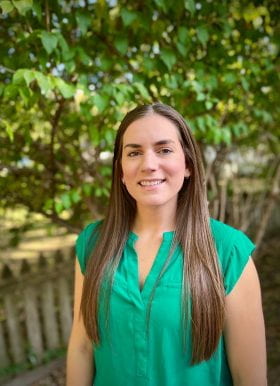
Kara Andres
Kara Andres is an aquatic ecologist who applies molecular approaches to study aquatic biodiversity, the spread of invasive species, and the ecological consequences of human impacts in freshwater systems. Her research has explored the use of environmental DNA (eDNA) approaches to study the population genetics and abundance of invasive fishes. As a Postdoctoral Fellow with the Living Earth Collaborative, she will collaborate with Dr. Fangqiong Ling (WUSTL) and Dr. Jason Knouft (SLU) to investigate the microbiomes of native and invasive freshwater fishes to better understand the role of the microbiome in invasion success. You can follow Kara’s research on her website: https://karaandres.weebly.com/.
- Email: akara@nospam.wustl.edu
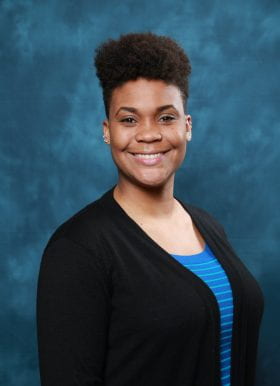
Kaylee Arnold
Kaylee Arnold is a disease ecologist who studies how anthropogenic disturbances impact host-associated microbial communities and infectious disease transmission. Her research has previously explored the relationships between the gut microbiomes of insect disease vectors, deforestation, and vector-borne disease transmission risk. As a Living Earth Collaborative Biodiversity Postdoctoral Fellow, Kaylee will be working with Drs. Rachel Penczykowski (WUSTL), Danielle Lee (SIUE), and Solny Adalsteinsson (Tyson Research Center) to explore plant microbiomes and fungal pathogen transmission across an urbanization gradient and to develop STEM projects with K-12 public schools in St. Louis. Please visit Kaylee’s website: https://www.arnoldkaylee.com and Twitter: @Black_Ecologist to learn more about her research and outreach.
- Email: akaylee@nospam.wustl.edu
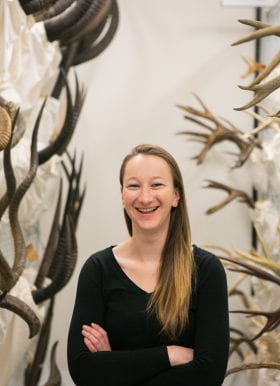
Elizabeth Carlen
Elizabeth Carlen is an evolutionary ecologist with an interest in urban evolution and ecology across taxa. While she has a particular interest in mammals, she has also worked with anoles in Puerto Rico and pigeons in the Northeastern United States (the New York Times even dubbed her “The Pigeon Stalker”). As a Living Earth Collaborative Biodiversity Postdoctoral Fellow, Elizabeth will be working with Dr. Jonathan Losos (WUSTL) to examine the influence of urbanization on the evolution of eastern gray squirrel in St. Louis.
- Email: ecarlen@nospam.fordham.edu
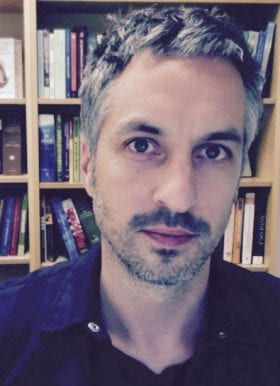
John Grady
John Grady is an ecologist interested in how physiology drives broad patterns of diversity across space and time. His research includes work on shark, dinosaur, and shrew thermoregulation, predator-prey interactions, and global biogeography. John is currently collaborating with Keith Hengen (Washington University) and Anthony Dell (National Great Rivers) to study endotherm-ectotherm predation, behavior, and spatial diversity.
- Email: gradyj@nospam.wustl.edu
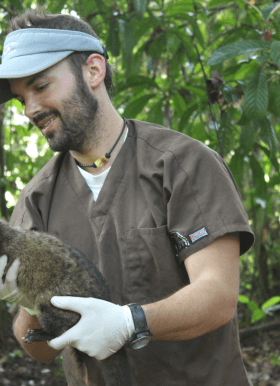
Fernando Najera
Fernando Nájera is a wildlife veterinarian and carnivore ecologist who investigates disease dynamics and spatial ecology in small, fragmented and/or endangered carnivore populations. His previous research includes focus on the physiology and health of free-living and captive Sunda clouded leopards and mainland clouded leopards, and the effect of disease on reintroduced populations of the Iberian lynx and the sympatric carnivore community. As a Postdoctoral Fellow with the Living Earth Collaborative, Fernando will work to understand disease prevalence and spatial ecology of the carnivore guild in Missouri, while also understanding their role as sentinels of ecosystem health. This collaborative effort includes WUSTL, Saint Louis Zoo, and the Endangered Wolf Center (EWC), with Drs. Sharon L. Deem and Lisa Kelley, and Regina Mossotti as mentors to help ensure a successful investigation.
- Email: fnajera@nospam.stlzoo.org
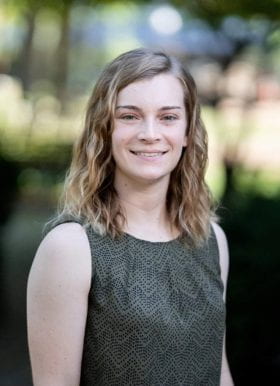
Stella Uiterwaal
Stella Uiterwaal is a community ecologist focusing on predator-prey interactions. Her research combines experimental and field-based approaches to understand the causes and consequences of predation. Stella has previously developed new methods for quantifying predators’ diets and foraging rates. As a Biodiversity Postdoctoral Fellow, Stella is working with the Forest Park Living Lab project to study the movement ecology of wildlife across trophic levels, including owls, turtles, raccoons, and more. This work is in collaboration with Drs. Anthony Dell (National Great Rivers Research and Education Center), Stephen Blake (Saint Louis University), and Sharon Deem (Saint Louis Zoo).
- Email: stellau@nospam.wustl.edu
Former LEC Post-docs
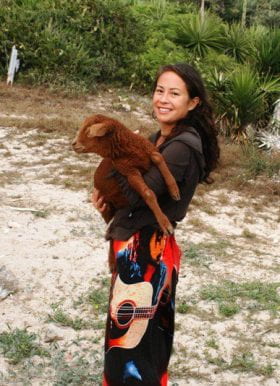
Jess Carag
Jess Carag is a veterinarian and One Health practitioner with a passion for global health and development. She is particularly interested in the effects of smallholder livestock health and related cultural practices on food security and infectious disease transmission in the developing world. In addition to her DVM, Jess received a master’s degree in public health with a focus on emerging infectious diseases. She has worked on research projects ranging from clinical HIV drug trials to parasitology of wild primates. Jess has spent extensive time in Madagascar assisting with field research on wild brown mouse lemurs and as a Peace Corps Volunteer teaching English and promoting community awareness of local conservation issues in the deep south of the island. Jess will work with Drs. Sharon Deem (Saint Louis Zoo) and Carolyn Lesorogol (Brown School at WUSTL) to examine the relationship of livestock health to conservation efforts in Madagascar. Using a conservation medicine framework, Jess will apply clinical and participatory methodology to determine major threats to livestock and ecosystem health and identify sustainable interventions to promote improved food security and decreased reliance on shifting land use practices in rural communities.
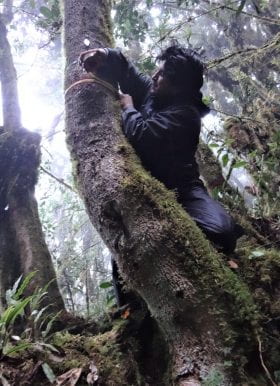
William Farfan-Rios
William Farfan-Rios is an avid forest ecologist with long-standing field experience. His research is focused on the study of tropical tree communities’ composition, dynamics, distribution and their responses to global change. He has been coordinating and leading field campaigns and research projects in the Andean-Amazonian elevational transect established by the Andes Biodiversity and Ecosystem Research Group. Working closely with Drs. Jonathan Myers (Washington University) and Sebastian Tello (Missouri Botanical Garden), William will integrate data of long-term forests inventories across the Andes-to-Amazon elevational gradients in six countries. He will use the elevational transects as a natural laboratory to explore the effects of anthropogenic climate change on tropical biodiversity and ecosystem processes.
- Email: farfanriosw@nospam.wustl.edu
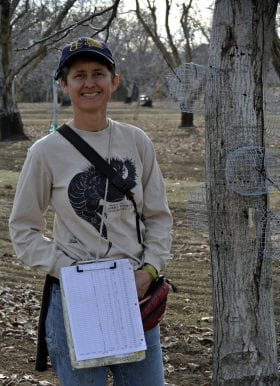
Sacha Heath
Sacha Heath is a conservation ecologist who conducts research to inform and evaluate biodiversity conservation. Her studies have taken her from Alaska to Antarctica and from pristine wilderness areas to human dominated working lands. While Sacha has a soft spot for feathered creatures—and birds have been the focus of most of her research—she is also fascinated by complex ecological interactions involving multiple taxa. As a Living Earth Collaborative Biodiversity Postdoctoral Fellow, Sacha will be focusing on the ecology of urban bird communities. In collaboration with Gerardo Camilo (St. Louis University), Solny Adalsteinsson (Tyson Research Center), Anne Tieber (St. Louis Zoo), and St. Louis Audubon, Sacha will study the effectiveness of a citizen-based backyard conservation program along a rural-to-urban gradient of the St. Louis metropolitan area.
- Email: skheath@nospam.wustl.edu
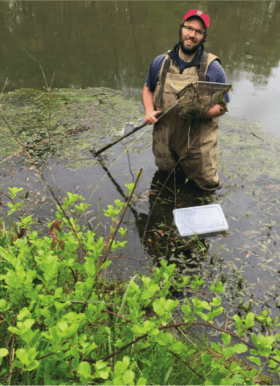
Michael Moore
Michael Moore is a biologist with expertise in the evolution of animal life cycles and mating interactions. His research is revealing the ways in which animals adapt to living in different habitats across their life cycles. Michael has studied a diverse suite of animals in regions across the United States including amphibians, fish, dragonflies, and ladybugs. Collaborating with Drs. Kasey Fowler-Finn (Saint Louis University) and Kim Medley (Tyson Research Center), Michael will explore how animal breeding colors adapt to warmer climates. This research will help biologists understand factors responsible for the global diversity of animal color patterns and should provide insight into how these captivating traits will respond to the climates of the future.
- Email: mpmoore@nospam.wustl.edu
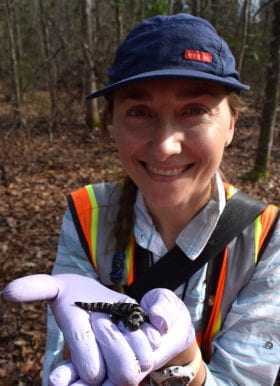
Michel Ohmer
Michel Ohmer is an ecophysiologist and disease ecologist who studies the impact of global change on host-pathogen interactions. She seeks to understand why some species and individuals are at a greater risk of disease than others and use this information to predict population-level impacts. Michel’s research explores these questions using amphibians and a widespread fungal pathogen, Batrachochytrium dendrobatidis (Bd), to better understand how the host-pathogen relationship is shaped by host physiology, and how environmental change can alter this relationship. As a Living Earth Collaborative postdoctoral fellow, Michel will work to future-proof our predictions of the impacts of disease on amphibian populations in the face of changing global conditions. In collaboration with Lauren Augustine (St. Louis Zoo), Dr. Kim Medley (Washington University), and Drs. Kasey Fowler-Finn and Dan Warren (St. Louis University), Michel will combine measures of amphibian thermal physiology across populations with mechanistic modeling to predict refuges from disease in a changing climate.
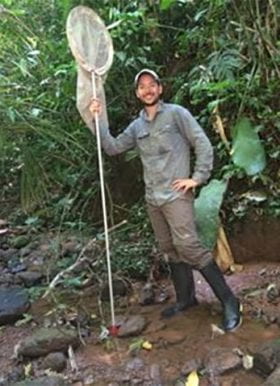
Brett Seymoure
Grossman Family Postdoctoral Fellow – Brett Seymoure studies how natural and anthropogenic lighting affects myriad organisms. Brett has studied how tropical butterflies have evolved in different rainforest light environments and how gas developments in the Rocky Mountains affect mammals. As the Grossman Family Post-Doctoral Fellow, he will work with Kasey Fowler-Finn (Saint Louis University), Anthony Dell (National Great Rivers Research and Education Center), and Amanda Koltz (Washington University) to study how light drives food webs and predator-prey interactions in spiders and insects. Our understanding of how increased light conditions at night affect community interactions is limited and is especially lacking in the case of predator-prey interactions in arthropods (e.g. spiders and insects). Arthropods contribute the most to ecosystem services of any animal group and arthropods have had global declines in abundance over the last few decades. To understand how global change will alter ecosystem services and biodiversity, an understanding of how light at night will alter arthropod communities is needed. Brett will investigate the effects of anthropogenic lighting at night on predation in arthropods by addressing three major research aims: (1) quantify effects of light conditions on arthropod behavior and predator-prey interactions; (2) measure visual abilities for respective species; and 3) integrate behavioral and physiological data to understand how light structures arthropod communities to make predictions of effects of light pollution on global arthropod biodiversity.
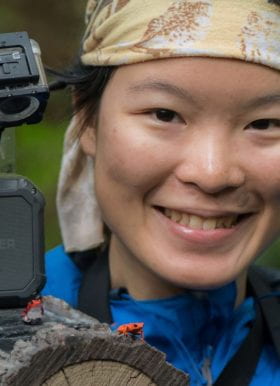
Yusan Yang
Yusan Yang’s research has demonstrated that behaviors shaped by learning can be a powerful driving force in evolution. Yusan has studied frogs in which populations differ in color to investigate whether they also differ in behavior and whether these differences lead to divergence into different species. As a Living Earth Collaborative Postdoctoral Fellow, Yusan will continue to study the role of animal behavior in mediating rapid evolution. In collaboration with Drs. Swanne Gordon, Andrés López-Sepulcre, Bruce Carlson (Dept. of Biology), and Paulo Natenzon (Dept. of Economics) at Washington University, she will explore how genetic and environmental influences on mating behavior modulate ecological and evolutionary processes in Trinidadian guppies.
- Email: yusan.yang@nospam.pitt.edu